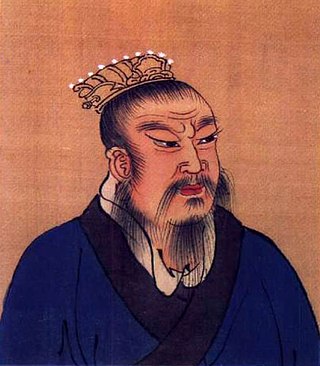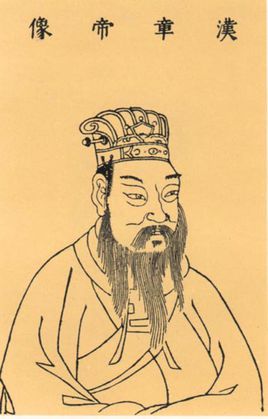
劉 / 刘 is an East Asian surname. pinyin: Liú in Mandarin Chinese, Lau4 in Cantonese. It is the family name of the Han dynasty emperors. The character 劉 originally meant 'kill', but is now used only as a surname. It is listed 252nd in the classic text Hundred Family Surnames. Today, it is the 4th most common surname in Mainland China as well as one of the most common surnames in the world.
King Qing of Zhou, personal name Jī Rénchén, was the nineteenth king of the Chinese Zhou Dynasty and the seventh of the Eastern Zhou.

Emperor Gaozu of Han, born Liu Bang with courtesy name Ji (季), was the founder and first emperor of the Han dynasty, reigning in 202–195 BC. His temple name was "Taizu" while his posthumous name was Emperor Gao, or Gaodi; "Gaozu of Han", derived from the Records of the Grand Historian, is the common way of referring to this sovereign even though he was not accorded the temple name "Gaozu", which literally means "High Founder".
Ruzi Ying, personal name Liu Ying (劉嬰), was the last ruler of the Chinese Western Han Dynasty. He was the titular ruler of the Han Empire from 6 CE to 9 CE, even though he did not officially ascend to the throne and only assumed the title of crown prince. After Emperor Ai and Emperor Ping died without heirs, Wang Mang chose the youngest of the available successors in order to maintain his power in the government. The child Ying was soon deposed by Wang Mang who declared the Xin dynasty in place of the Han. During the Xin Dynasty, Ying was under effective house arrest—so much so that as an adult, he did not even know the names of common animals. Before and after the Xin Dynasty was overthrown in 23 CE, a number of ambitious individuals claimed to be restoring the Han dynasty. In 25 CE, a rebellion against the Gengshi Emperor used the former Emperor Ruzi as a focus, and when the rebellion was defeated, Liu Ying (Ruzi) was killed. He is often viewed as an innocent child who was the victim of tragic circumstances.
The Gengshi Emperor, born Liu Xuan, was an emperor of the Han dynasty restored after the fall of Wang Mang's Xin dynasty brought on by the Lülin. He was also known by his courtesy name Shenggong and as the King or Prince of Huaiyang, a posthumous title bestowed upon him by Emperor Guangwu of the Eastern Han. The Gengshi Emperor was viewed as a weak and incompetent ruler, who briefly ruled over an empire willing to let him rule over them, but was unable to keep that empire together. He was eventually deposed by the Chimei and strangled a few months after his defeat.

Emperor Guangwu of Han, born Liu Xiu (劉秀), courtesy name Wenshu (文叔), was a Chinese monarch. He served as an emperor of the Han dynasty by restoring the dynasty in AD 25, thus founding the Eastern Han dynasty. He ruled over parts of China at first, and through suppression and conquest of regional warlords, the whole of China proper was consolidated by the time of his death in AD 57. During his reign, Taoism was made the official religion of China, and the Chinese folk religion began to decline.

Emperor Zhang of Han, born Liu Da (劉炟), was an emperor of the Chinese Han dynasty from 75 to 88. He was the third emperor of the Eastern Han.
Emperor He of Han was an emperor of the Chinese Han dynasty who ruled from 88 to 106. He was the 4th emperor of the Eastern Han.

Emperor Xian of Han, personal name Liu Xie (劉協), courtesy name Bohe, was the 14th and last emperor of the Eastern Han dynasty in China. He reigned from 28 September 189 until 11 December 220.
Liu Yu was a Chinese military general, politician, and warlord who lived during the Eastern Han dynasty.

Emperor Wu of Liu Song, personal name Liu Yu (劉裕), courtesy name Dexing (德興), childhood name Jinu (寄奴), was a statesman and strategist of Imperial China, and the founding emperor of the Chinese Liu Song dynasty. He came from a humble background, but became prominent after leading a rebellion in 408 to overthrow Huan Xuan, who had usurped the Eastern Jin throne in 403. After that point, using a mixture of political and military skills, Liu Yu gradually concentrated power in his own hands while expanding Jin's territory. In 420, he forced Emperor Gong of Jin to yield the throne to him, thus ending the Eastern Jin dynasty and establishing the Liu Song dynasty. He ruled only briefly, for two years, before dying and passing the throne to his son, Emperor Shao of Liu Song. An outstanding commander, perhaps the greatest of his era, he conquered two of the Sixteen Kingdoms and remained undefeated throughout his military career. The History of the Southern Dynasties described Liu Yu as seven chi and six cun tall

Han is a common Chinese surname. The spelling "Han" is based on China's pinyin system and so used throughout Mainland China. Spelling can vary from 'Hon' in Cantonese-speaking areas to 'Hang' in Hainan. It is the 15th name on the Hundred Family Surnames poem. In 2003, Han (韩) is ranked 25th in China in terms of the number of bearers at around 8 million persons. In 2019 it was the 28th most common surname in Mainland China.
Cao Teng, courtesy name Jixing, was a eunuch who lived during the Eastern Han dynasty of China. He served four Han emperors. Through his adopted son Cao Song, he was the grandfather of Cao Cao, who laid the foundations for the state of Cao Wei in the Three Kingdoms period. In 220, upon the establishment of Wei by Cao Cao's son Cao Pi, Cao Teng was posthumously honoured as "Emperor Gao of Wei" (魏高帝), becoming the only eunuch in Chinese officialdom to have this honor.
Liu Yu was a prince of the Western Han Dynasty. He was the fifth son of Emperor Jing. His mother was Consort Cheng (程妃). In 155 BC he was instated as Prince of Huaiyang (淮陽王), but a year later his title was later changed to Prince of Lu (魯王).
Prince or King of Yan was a Chinese feudal title referring to the ancient Chinese State of Yan and to its fiefs including the capital Yanjing.






